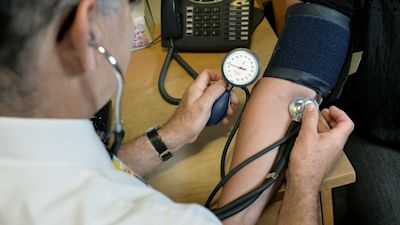Face-to-face GP appointments remain near lockdown levels

Fewer than 60% of GP appointments in England were conducted face-to-face last month, marking only a slight increase from levels over lockdown.
Data from NHS Digital, published on Thursday, shows 58% of appointments were carried out face-to-face in August this year, the first full month since most legal restrictions were lifted in England.
This compares to 52% in August last year and around 80% before the pandemic in August 2019.
For all of this year, the proportion of in-person appointments has been between 50% and 60%.
The figures come as GPs have been under fire for not offering enough face-to-face appointments, with Health Secretary Sajid Javid saying the government would urge them to do so.
More telephone consultations
Meanwhile the data also shows the proportion of telephone consultations rose from 14% in August 2019 to 38% last month.
In August last year 43% of GP appointments were carried out over the phone.
ITV News Health Editor Emily Morgan heard from a doctor about the pressures facing his medical centre in North London earlier this month
During the first wave of coronavirus between April and July last year, the proportion of face-to-face appointments dropped below 50%.
The highest proportion of telephone appointments was 47.8% in April last year – the month after the first national lockdown began.
In April, May and June of 2020 there were more telephone appointments than face-to-face consultations.
'Face-to-face consulting will always be essential'
Professor Martin Marshall, chair of the Royal College of GPs, said the figures show it is a “misconception” that GPs and their teams are not seeing patients face-to-face.
He added: “Huge numbers of GP appointments are being made every day, almost half on the same day they are booked, with a higher proportion being made in person in August than July and all in line with infection control measures to keep patients safe.
“This is against a backdrop of intense workload and workforce pressures in general practice.
“Remote consulting will not always be appropriate. This is why in-person appointments are being made – making up almost six in 10 consultations in August – and have been throughout the pandemic when they’ve been necessary.
“Face-to-face consulting will always be an essential part of general practice and as we move out of the pandemic.
"We want to see a blended approach with decisions about how care is delivered being a joint one between GP practices and their patients.”
What will the government do about it?
Earlier this month Mr Javid told MPs that the government “intends to do a lot more” to ensure GPs see more patients face-to-face, although he did not give details of what action is planned.
He said: “I think everyone can understand why during the height of the pandemic that GPs couldn’t provide access in the normal way.
“But we’re way past that now, life is starting to return almost back to completely normal and as that is happening it should be happening in our GP surgeries too, and more GPs should be offering face-to-face access.”
Listen to our coronavirus podcast:
Mr Javid also said patients should have a choice, noting that some prefer a virtual appointment.
He added: “The important thing is that for those who want to have a face-to-face appointment it should be made available.”
GP leaders say 'it's case of being sensible'
GP leaders hit back at his comments, claiming the pandemic is not over and warning that having more people back in waiting rooms risks spreading Covid to vulnerable patients.
British Medical Association council chairman Dr Chaand Nagpaul said earlier this month that GPs want to see patients face-to-face.
But he added: “The one thing GP practices should not be doing is having people walking out more ill than they came in.
“Most GPs have waiting rooms that are often packed, they were never designed for social distancing, therefore if we were trying to regain normality we would have people who are elderly, many clinically vulnerable, who would be at risk.
“I do not agree the pandemic is behind us, far from it, infections are as high as during previous lockdowns.
“It’s a case of being sensible.”